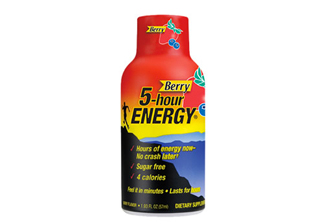5-Hour Energy Cited by FDA in 13 Deaths

 Popular supplement 5-Hour Energy has been cited by the Food and Drug Administration in the possible involvement in 13 deaths over the past four years. According to the New York Times, the product has been mentioned in 90 FDA filings, including more than 30 involving serious or life-threatening injuries such as heart attacks, convulsions and even a spontaneous abortion, although an FDA incident report does not confirm the product’s responsibility in the incidents.
Popular supplement 5-Hour Energy has been cited by the Food and Drug Administration in the possible involvement in 13 deaths over the past four years. According to the New York Times, the product has been mentioned in 90 FDA filings, including more than 30 involving serious or life-threatening injuries such as heart attacks, convulsions and even a spontaneous abortion, although an FDA incident report does not confirm the product’s responsibility in the incidents.
Living Essentials, the manufacturer of 5-Hour Energy, denies any health risks if the product, which is sold as dietary supplement rather than a drink.
“5-hour Energy is a compact-sized energy shot intended for busy adults; it is not an energy drink, not marketed as a beverage,” Living Essentials said in an issued statement. “Living Essentials, LLC is unaware of any deaths proven to have been caused by the consumption of 5-hour energy. It is important to note that submitting a serious adverse event report the FDA, according to the agency itself, is not construed by the FDA as an admission that the dietary supplement was involved, caused or contributed to the adverse event being reported, or than any person included in the report caused or contributed to the event.”
Shots of 5-Hour Energy do not list the amount of caffeine included in each bottle, but a recent Consumer Reports article stated each dose includes about 215 milligrams of caffeine, compared to an average eight-ounce cup of coffee which contains 100 to 150 milligrams of caffeine. FDA requirements for listing caffeine and other energy product ingredients are complicated because some products, like Red Bull, are sold as beverages while others are sold as dietary supplements. Each category has different rules regarding ingredient reporting. Both categories might deserve a second look, however. In 2009 the Substance Abuse and Mental Health Services Administration reported more than 13,000 emergency room visits associated with energy drinks.
And 5-Hour Energy isn’t the first energy product to be cited with the FDA. Last month Monster Energy, a popular energy drink, was associated with five deaths over three years, according to FDA incident reports. The reports were obtained after Wendy Crossland filed a lawsuit against Monster Beverage over the death of her teenaged daughter. The suit charges that Monster failed to warn about the risks of its beverages. Crossland’s 14-year-old daughter died in December from a heart arrhythmia after she consumed two cans of Monster Energy over two days. Each 24-ounce can of Monster Energy the Maryland teenager drank prior to her death contains 240 milligrams of caffeine.









































